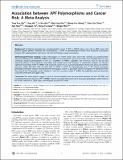| dc.contributor.author | Shi, Ting-Yan | |
| dc.contributor.author | He, Jing | |
| dc.contributor.author | Qiu, Li-Xin | |
| dc.contributor.author | Zhu, Mei-Ling | |
| dc.contributor.author | Wang, Meng-Yun | |
| dc.contributor.author | Zhou, Xiao-Yan | |
| dc.contributor.author | Han, Jiali | |
| dc.contributor.author | Yu, Hongpin | |
| dc.contributor.author | Zang, Rong-Yu | |
| dc.contributor.author | Wei, Qingyi | |
| dc.date.accessioned | 2013-03-18T19:35:39Z | |
| dc.date.issued | 2012 | |
| dc.identifier.citation | Shi, Ting-Yan, Jing He, Li-Xin Qiu, Mei-Ling Zhu, Meng-Yun Wang, Xiao-Yan Zhou, Jiali Han, Hongpin Yu, Rong-Yu Zang, and Qingyi Wei. 2012. Association between XPF polymorphisms and cancer risk: a meta-analysis. PLoS ONE 7(7). | en_US |
| dc.identifier.issn | 1932-6203 | en_US |
| dc.identifier.uri | http://nrs.harvard.edu/urn-3:HUL.InstRepos:10436340 | |
| dc.description.abstract | Background: Xeroderma pigmentosum complementation group F (XPF or ERCC4) plays a key role in DNA repair that protects against genetic instability and carcinogenesis. A series of epidemiological studies have examined associations between XPF polymorphisms and cancer risk, but the findings remain inconclusive. Methodology/Principal Findings: In this meta-analysis of 47,639 cancer cases and 51,915 controls, by searching three electronic databases (i.e., MEDLINE, EMBASE and CNKI), we summarized 43 case-control studies from 29 publications on four commonly studied polymorphisms of XPF (i.e., rs1800067, rs1799801, rs2020955 and rs744154), and we did not find statistical evidence of any significant association with overall cancer risk. However, in stratification analyses, we found a significant association of XPF-rs1799801 with a reduced cancer risk in Caucasian populations (4,845 cases and 5,556 controls; recessive model: OR = 0.87, 95% CI = 0.76–1.00, P = 0.049, P = 0.723 for heterogeneity test, I2 = 0). Further genotype-phenotype correlation analysis showed that the homozygous variant CC genotype carriers had higher XPF expression levels than that of the TT genotype carriers (Student’s t test for a recessive model: P = 0.046). No publication bias was found by using the funnel plot and Egger’s test. Conclusion: This meta-analysis suggests a lack of statistical evidence for the association between the four XPF SNPs and overall risk of cancers. However, XPF-rs1799801 may be associated with cancer risk in Caucasian populations, which needs to be further validated in single large, well-designed prospective studies. | en_US |
| dc.language.iso | en_US | en_US |
| dc.publisher | Public Library of Science | en_US |
| dc.relation.isversionof | doi:10.1371/journal.pone.0038606 | en_US |
| dc.relation.hasversion | http://www.ncbi.nlm.nih.gov/pmc/articles/PMC3388076/pdf/ | en_US |
| dash.license | LAA | |
| dc.subject | Biology | en_US |
| dc.subject | Genetics | en_US |
| dc.subject | Population Genetics | en_US |
| dc.subject | Genetic Polymorphism | en_US |
| dc.subject | Cancer Genetics | en_US |
| dc.subject | Medicine | en_US |
| dc.subject | Clinical Research Design | en_US |
| dc.subject | Meta-Analyses | en_US |
| dc.subject | Epidemiology | en_US |
| dc.subject | Cancer Epidemiology | en_US |
| dc.subject | Molecular Epidemiology | en_US |
| dc.subject | Oncology | en_US |
| dc.subject | Cancer Risk Factors | en_US |
| dc.subject | Genetic Causes of Cancer | en_US |
| dc.title | Association between XPF Polymorphisms and Cancer Risk: A Meta-Analysis | en_US |
| dc.type | Journal Article | en_US |
| dc.description.version | Version of Record | en_US |
| dc.relation.journal | PLoS ONE | en_US |
| dash.depositing.author | Han, Jiali | |
| dc.date.available | 2013-03-18T19:35:39Z | |
| dc.identifier.doi | 10.1371/journal.pone.0038606 | * |
| dash.contributor.affiliated | Han, Jiali | |


